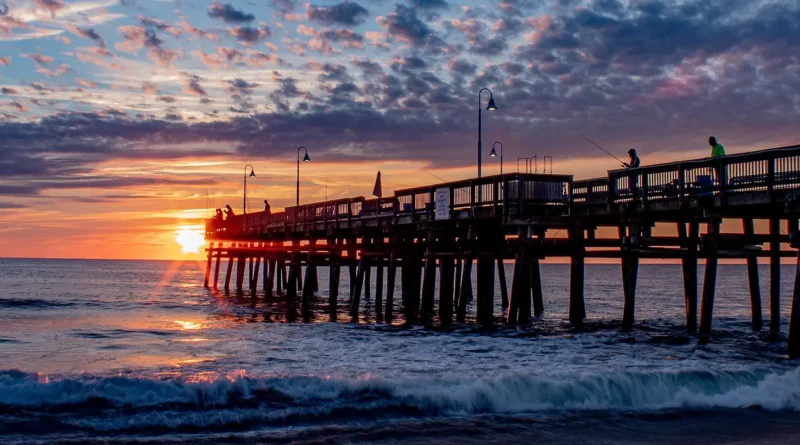History of Virginia Beach Virginia
Virginia Beach, Virginia, is a vibrant coastal city known for its sandy beaches, bustling boardwalk, and rich cultural scene. But beneath the modern attractions and seaside charm lies a deep and varied history that has shaped the city into what it is today. From its early days as a colonial settlement to its transformation into one of the most popular tourist destinations on the East Coast, Virginia Beach’s history is a story of growth, adaptation, and resilience.
Early Native American Inhabitants
Long before European settlers arrived on the shores of what is now Virginia Beach, the area was inhabited by Native American tribes, most notably the Chesapeake and the Powhatan Confederacy. The Chesapeake people, who lived in the area now known as the Lynnhaven River, were part of a larger network of Algonquian-speaking tribes that dominated much of the coastal region. These tribes thrived on the area’s abundant natural resources, fishing in the rivers and bays, hunting in the forests, and cultivating crops.
The Chesapeake Bay area was rich in marine life, providing a steady source of food and materials for the indigenous population. The arrival of European explorers, however, would soon change the region forever.
European Exploration and the Founding of Virginia Beach
The first recorded European exploration of the Virginia Beach area occurred in 1607, when the English settlers aboard the Susan Constant, Godspeed, and Discovery made landfall at Cape Henry, the northern tip of what is now Virginia Beach. This event, known as the “First Landing,” marked the beginning of English colonization in North America.
The settlers, led by Captain Christopher Newport, were part of the Virginia Company’s expedition to establish a permanent English colony in the New World. After a brief stay at Cape Henry, the settlers moved inland to establish Jamestown, the first permanent English settlement in America. While Jamestown became the focal point of early colonial activity, the Cape Henry area remained strategically important due to its location at the mouth of the Chesapeake Bay.
In 1609, the Cape Henry area witnessed another significant event when the Sea Venture, the flagship of a resupply mission to Jamestown, was wrecked on Bermuda during a hurricane. The survivors of the shipwreck eventually made their way to the Jamestown colony, but the incident highlighted the dangers of sea travel in the region.
The Colonial Era and the Growth of Lynnhaven Parish
Throughout the 17th and 18th centuries, the area around Cape Henry gradually developed into a small but prosperous community. The establishment of Lynnhaven Parish in 1639 marked the formal organization of the area’s first English community. The parish, which covered much of present-day Virginia Beach, became the center of religious, social, and economic life for the early settlers.
Agriculture, particularly the cultivation of tobacco, played a crucial role in the local economy during the colonial period. The fertile soil of the region supported large plantations, and the area’s proximity to the Chesapeake Bay made it an ideal location for shipping and trade. The Lynnhaven River became a vital waterway for transporting goods to and from the plantations, contributing to the economic growth of the region.
However, life in the colony was not without challenges. The area was subject to frequent attacks by pirates, including the infamous Blackbeard, who used the nearby inlets and rivers as hideouts. The threat of piracy, along with the constant dangers posed by disease and harsh living conditions, made life in colonial Virginia a precarious existence.
The American Revolution and the Early Republic
During the American Revolution, the area now known as Virginia Beach played a strategic role in the conflict. The Chesapeake Bay and its surrounding waters were the site of several naval engagements, and the region’s ports were crucial for supplying the Continental Army. The Battle of the Capes, fought in 1781 near the mouth of the Chesapeake Bay, was a pivotal naval battle that helped secure American victory at the Siege of Yorktown, effectively ending the war.
In the years following the Revolution, the region continued to grow as new settlers moved into the area, attracted by the fertile land and opportunities for trade. The early 19th century saw the development of small towns and villages, including the establishment of Virginia Beach as a resort destination.
The Birth of a Resort Town
The development of Virginia Beach as a resort town began in earnest in the late 19th century. The construction of the Norfolk and Virginia Beach Railroad in 1883 made the area more accessible to visitors from nearby cities, particularly Norfolk. The railroad brought an influx of tourists eager to escape the summer heat and enjoy the cool breezes and sandy beaches of the Atlantic Ocean.
The opening of the original Princess Anne Hotel in 1888 marked the beginning of Virginia Beach’s transformation into a premier vacation destination. The hotel, located near the present-day site of the Virginia Beach Boardwalk, offered luxurious accommodations and attracted wealthy visitors from across the region.
The early 20th century saw continued growth in Virginia Beach’s tourism industry, with the construction of new hotels, cottages, and attractions. The Virginia Beach Boardwalk, originally built in 1888 and expanded in the early 1900s, became the centerpiece of the resort town, offering a scenic promenade along the oceanfront.
The 20th Century: Growth and Development
The early decades of the 20th century brought rapid development to Virginia Beach. The completion of the Chesapeake Bay Bridge-Tunnel in 1964, which connected Virginia Beach to the Eastern Shore of Virginia, further boosted tourism and made the area more accessible to travelers from the North.
During World War II, Virginia Beach played a crucial role in the war effort as the site of several military installations, including the Naval Air Station Oceana, which remains one of the largest and most important naval air stations in the United States today. The presence of the military contributed to the city’s growth, bringing new residents and economic opportunities to the area.
In 1963, the City of Virginia Beach was officially incorporated, merging with the larger Princess Anne County to form what is now known as the City of Virginia Beach. This consolidation allowed for more efficient governance and provided the framework for future growth and development.
Virginia Beach Today: A Thriving Coastal City
Today, Virginia Beach is the most populous city in Virginia and one of the most popular tourist destinations on the East Coast. The city’s economy is driven by tourism, military activity, and a growing technology sector. Virginia Beach’s beautiful beaches, vibrant cultural scene, and numerous recreational opportunities continue to attract millions of visitors each year.
The Virginia Beach Boardwalk remains a central attraction, lined with hotels, restaurants, shops, and entertainment venues. The city also boasts a rich arts and culture scene, with attractions such as the Virginia Museum of Contemporary Art (MOCA), the Sandler Center for the Performing Arts, and the annual Neptune Festival, which celebrates the city’s maritime heritage.
In addition to its cultural offerings, Virginia Beach is home to numerous parks and natural areas, including First Landing State Park, where the English settlers made their first landfall in 1607, and Back Bay National Wildlife Refuge, a haven for birdwatchers and nature enthusiasts.
Virginia Beach’s history is a testament to the resilience and adaptability of its people. From its early days as a colonial outpost to its emergence as a modern resort city, Virginia Beach has continuously evolved, embracing change while preserving its rich heritage.
Discover more from City Towner
Subscribe to get the latest posts sent to your email.




